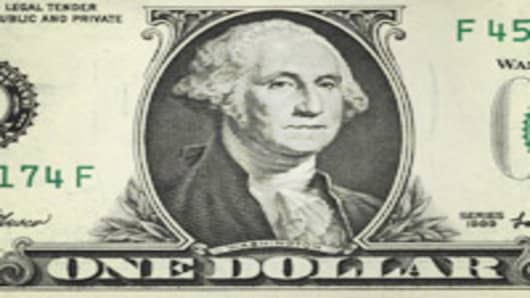The euro plunged against the U.S. dollar after a European Central Bank official told Bloomberg News the central bank may revise down its euro zone growth forecasts for 2008.
Yves Mersch, a member of the ECB's governing council, said the bank should remain flexible with risks to euro zone inflation also increasing.
Mersch's comments threw foreign exchange investors into a frenzy with the euro's decline feeding on itself as it broke through key technical levels against the dollar and other currencies. The move marked a reversal for the dollar, which earlier in the session had fallen to a nearly three-year low against the yen.
"The ECB's Mersch is throwing a spanner into the euro market, highlighting the downside risks to growth and suggesting the ECB needs to be flexible with regard to fighting inflation," said Brian Dolan, chief currency strategist at Forex.com in Bedminster, New Jersey. "His comments sent EUR/USD down to the overnight lows, which have just broken leading to follow-through selling."
The euro traded down against the dollar , though well off the session low of $1.4596. The euro hovered near the flatline against the yen , while the dollar gained against the yen .
"There will be a moderation of growth inside Europe," Mersch was quoted as saying by news agency Bloomberg.
Bloomberg said Mersch could not rule out a downward revision in March of the ECB's staff forecast for growth of 1.5 percent to 2.5 percent this year. It quoted him as saying growth should be below but close to its potential rate of about 2 percent.
Fed Expectations
Earlier, the dollar had struggled as data showing relatively modest U.S. inflation kept alive expectations the Federal Reserve will cut interest rates to rescue a flagging economy.
A dismal reading of December retail sales on Tuesday suggested the U.S. economy might be facing deeper problems, and tumbling stock markets in the United States and around the world fueled expectations that the Fed later this month may cut rates by as much as 75 basis points to rescue the economy.
But higher prices at a time of slowing growth presents a dilemma for the Fed.
Reports showing better-than-expected U.S. long-term capital inflows in November and unchanged U.S. industrial production in December had little impact on trading.
"If the U.S. proceeds into the recession, the rest of the world has to be affected," said John McCarthy, director of trading at ING Capital Markets in New York. "With equity markets under pressure, risk reduction is the order of the day."
Worries about a U.S. recession have weighed on equity markets -- the Dow Jones industrial average is down almost 6 percent so far in 2008 -- and dampened risk appetite.
Currency investors have been less willing to hold relatively risky carry trades in which cheap borrowing in low-yielding currencies such as the yen and Swiss franc have funded the purchase of higher-yielding currencies.


